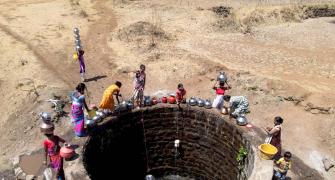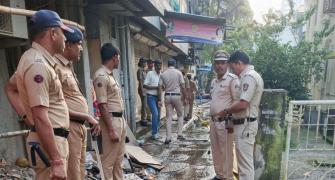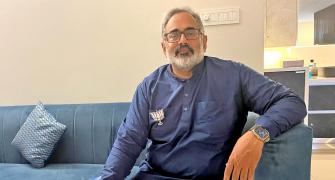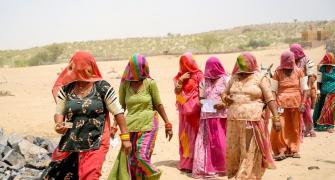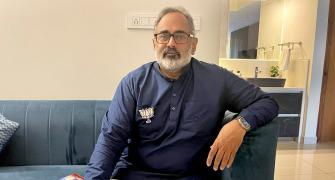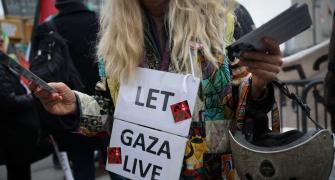 Reminding the nation to fulfill Mahatma Gandhi's pledge of "wiping every tear in every eye", President Pratibha Patil on Friday regretted that the benefits of a surging economy have not percolated to weaker sections.
Reminding the nation to fulfill Mahatma Gandhi's pledge of "wiping every tear in every eye", President Pratibha Patil on Friday regretted that the benefits of a surging economy have not percolated to weaker sections.
In her maiden Republic Day address to the nation, the President also called for strong measures to remove corruption and collective action to combat terrorism.
"Our efforts and our commitment, while pursuing the goal of high growth rates, should be to ensure that all people of our country benefit from it. Our pledge will remain unfulfilled until, as Gandhiji had said - we have wiped every tear in every eye," Patil said in her address on the eve of the 59th Republic Day.
The President said the country cannot look at the future without addressing the needs of under-privileged and disadvantaged sections of society.
Referring to several flagship programmes like Bharat Nirman and the Rural Health Mission, employment schemes in rural areas, she said their implementation "remains a challenge" and needed to be executed in a time-bound and transparent manner.
Warning that terrorism constituted a grave threat to the civilised world, the President said the continuing terror attacks were reminders of the need to take collective action.
Coming out strongly against the internal threats posed by Naxalism, Patil said "in a democracy, there is no place for violent methods... growth of Naxalism should be handled firmly".
Making a special reference to the scourge of corruption, the President said the country could not afford the loss of resources meant for its development.
"We must strengthen measures for the removal of corruption by bringing about greater transparency," she said. Patil spoke of the economy growing at "unprecedented" rate and said the "impressive strides" have resulted in the country's emergence as a powerful player in the global economy.
"This century will belong to Asia and India will be one of the main driving forces," the President said. Sounding a note of caution, she said one should not forget that the objective of development was not merely to create wealth but also to build a humane society.
"We cannot afford to have insular attitudes and be unconcerned about the needs of others," she said.
Noting that women constituted half the population, she said there should be laws for their empowerment and protection.
"We also need to address social evils like child marriage, female foeticide, female infanticide and dowry," the President said.
Last year, we celebrated 60 years of our Independence. It was a historic event. The journey has been long, but we have travelled far. Like any great journey, we have had our moments of triumph and glory as also our share of sorrows and travails. We overcame every obstacle and traversed every hurdle, because we consciously and firmly believed in India our Motherland, a nation with great civilisational strength, an underlying unity and a promising future.
All along we had an abiding faith in the talent and resilience of the people of India. We were inspired during this journey by the values of freedom, tolerance and plurality, which have given to India its defining identity a country with Unity in Diversity.
India, consisting of people with different religions, languages and customs, draws its inherent strength from each and everyone of its diverse units. Today, as a nation and as individual citizens, we must pledge to uphold this spirit of solidarity and respect for the multi-cultural, multi-religious and multi-ethnic character of India. We are the largest democracy in the world and one of the most stable. We have held 14 general elections to Parliament, in which power has been transferred to different political parties and groups according to the mandate of the people. Our vibrant and functioning democracy has won universal applause.
Following the Constitutional Amendments in 1992, we introduced democracy at the grassroots level. Today, there are 3.2 million representatives who have been elected from villages, towns and cities. We are also proud that 1.2 million of these elected representatives are women. This is by far the largest number of elected representatives ever in history, or anywhere in the contemporary world. Democracy has given a voice to all citizens of the country. We owe this to the sacrifices made by our freedom fighters, many of who laid down their lives, in the long and hard struggle for independence.
We have a sacred duty to follow the highest traditions of democratic principles and values. Our economy is growing at unprecedented rates and we can be confident that we will be able to achieve the growth targets we have set for ourselves. The impressive strides of the Indian economy have resulted in the emergence of India as a powerful player in the global economy. This century will belong to Asia and India will be one of the main driving forces. I recall that Pandit Jawaharlal Nehru, our first prime minister had described the birth of India as the rise of a new star.
Today, we see how true that statement was. Recently, during my interaction with some youth of the Indian diaspora, they told me that they had read about India's growing stature, but during their visit to India they could feel the power of India. Such is the impression that India makes on visitors. It is now time for realising India's tryst with destiny. The benefits of the upsurge in the economy, however, have not reached all sections of our population. In all good faith, we cannot look at the future, without first addressing the needs of the under-privileged and the disadvantaged sections of our society, with special emphasis on the empowerment of the Scheduled Castes, the Scheduled Tribes and other weaker sections of society.
We must ensure that they, too, should find a place to enjoy the sunshine of the country's growth and development. Our efforts and our commitment, while pursuing the goal of high growth rates, should be to ensure that all people of our country benefit from it. Our pledge will remain unfulfilled until, as Gandhiji had said - we have wiped every tear in every eye. The government has opted for not only faster, but also more inclusive growth in the 11th Five Year plan period from 2007 to 2012. This will be important for the overall progress and prosperity of all.
The government also has several flagship programmes like Bharat Nirman, the National Rural Employment Guarantee Programme, the Rural Health Mission, the Jawaharlal Nehru National Urban Renewal Mission and the Sarva Siksha Abhiyan. These are designed to improve the lives of the people. But their implementation remains a challenge. A question that we need to ask is how effective are our delivery mechanisms and what are the weaknesses? We have to find the appropriate remedial answers. I believe that people's participation is key to the effective implementation of programmes and projects. The involvement of local self-government bodies could improve delivery mechanisms as they are closer to implementation levels.
The entire government machinery has to work to fulfill the aspirations of the people. I call upon all concerned to deliver on social welfare schemes in a time bound manner as well as work with accountability and in a transparent manner.
When you work for the development of a country, it is not merely a job that has to be done, but it is a mission that has to be achieved. This should be the spirit in which development work is undertaken. I have noticed that often there is a lack of awareness among beneficiaries about schemes meant for their welfare and development. This means that they are unable to avail of the benefits meant for them. This situation needs to be rectified through awareness programmes. We need a band of committed social workers and civil society members to spread awareness and to share the onus of implementation by joining hands with the government.
Corruption is an evil that afflicts our system and we have to eliminate it. Every Rupee meant for development that goes out of the system due to corruption is a rupee less for our development programmes.
The country cannot afford the loss of resources meant for its development. We must strengthen measures for the removal of corruption by bringing about greater transparency.
Speaking at the Constituent Assembly on 25 November 1949, Baba Sahib Ambedkar stressed that freedom brings responsibility and that after having achieved independence we would have no excuse nor any one else to blame for our failures.
Each one of us is responsible for the progress and the future of India as also each one of us will have to bear blame for the shortcomings and deficiencies. I have often said that government, civil society, NGOs and every citizen will have to work collectively for the growth of society and for the advancement of the nation.
We must recognise that just as we ask for our rights, we have an obligation to perform our duties. Just as Gandhiji led the freedom struggle based on moral values, similarly all social, economic, administrative, political and educational activities should be carried out on the basis of moral values and social justice. Only then will our progress have a more
gentle and humane touch.
The country is faced with internal threats from Naxalism and terrorism. Whatever their grievances, those who use guns and subscribe to an extreme ideology, have not chosen the correct path.
In a democracy, there is no place for violent methods. Naxalites exploit sentiments of discontentment in the undeveloped parts of the country.
The government is committed to give special attention to the welfare of our tribals and marginal farmers as a part of its policy of seeking inclusive growth. At the same time growth of Naxalism should be handled firmly.
Seventy per cent of our population lives in rural areas. I am concerned about farmers committing suicide and hope that steps taken by the government to ameliorate their problems will rectify this situation.
The slow growth in the agriculture sector is a matter of concern but I am very hopeful of its potential. The Green Revolution showed that we could through our efforts become self-sufficient in food production and later we replicated this success in milk production as well.
Today, once again we need to give agriculture an impetus, to enhance productivity and to make our rural areas, centres of agro-processing and other related industries. We have one of the largest arable land areas in the world and I have no doubt that with better agricultural practices, land management and water management, agriculture will continue to play a pivotal role in the country.
In rural areas, the cooperative movement should work in a more forceful and pro-active manner by providing guidance to farmers and becoming more agriculturist-friendly. I appeal to agricultural scientists, experts and all concerned to
expeditiously work in the direction of bringing in a Second Green Revolution in the country.
The future of the world will be shaped by advances in science and technology and it will increasingly become knowledge-based.
Though we have a strong lead in information and communication technology and bio-technology sectors, we must continue to invest in research and development as also build up our educational institutions.
Students should be encouraged to pursue basic sciences. State governments and educational institutions should make special efforts to attract students to science disciplines.
Education is the most important tool for empowering the people of a country. Quest for knowledge has always been a part of the ethos of our country. It is for these reasons that since independence we have consistently sought to build a strong infrastructure for education.
As we work towards the goal of universal primary education by 2010, we should also aim to increase enrolment in higher education and technical education. I firmly believe that the light of modern education should touch every person - man and woman, boy and girl.
I call on the children and youth of our country to study and acquire knowledge for an enlightened future of India.
Women constitute about half of our population but face a number of challenges. There should be laws for the empowerment and protection of women and most importantly, their effective implementation.
We also need to address social evils like child marriage, female foeticide, female infanticide and dowry. I am concerned about the debilitating effect on individuals, families and societies of alcoholism and drug addiction. I would particularly call upon on women and the youth of the country to take up the challenge to eliminate these social evils and work towards changing social attitudes and mindsets.
As development takes place we should not forget that the objective is not merely to create wealth. It should be to build a humane society.
We cannot afford to have insular attitudes and be unconcerned about the needs of others. In this context, I would like to mention that persons with disabilities must get benefits and adequate opportunities to live a life of dignity.
The government recently announced a package of Rs 1,800 crore for providing one lakh jobs per year to persons with disabilities. Society must have a helpful and positive attitude towards the disabled and older citizens.
We must preserve and protect our rich cultural heritage and its values of compassion and harmonious living. In the joy of song and dance, painting and sculpture, literature and poetry we should discover and imbibe the best that has been passed on to us from generation to generation over millennia.
India has always had a vision and a message for the world. From the very beginning of our civilization, we have believed that the world is one and humanity is a single family.
India is committed to establish ties of friendship and co-operation with all countries. India's engagement with the world is intensifying both in the economic and political fields.
India is a country that has, and is, contributing to regional and global peace and stability. Today, terrorism constitutes a grave threat to the civilised world. The continuing terrorist attacks are reminders of the need to take collective action.
India will continue to work with the international community to create a better world a world free of terror, poverty, disease, ignorance and inequality.
I would like to once again convey my good wishes to my fellow citizens with a benediction for human welfare contained in the following lines written by the great poet, Kalidas:
May all experience bliss
May all wishes be fulfilled
May all rejoice everywhere
When the Tri-colour unfurls on Saturday, on the Republic Day, let each one of us commit ourselves to live up to our duties and responsibilities, conscious that we represent a great nation with a great destiny. Jai Hind.
Image: Rashtrapathi Bhavan.

